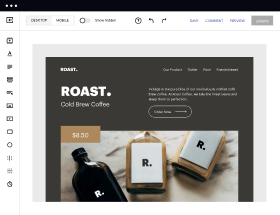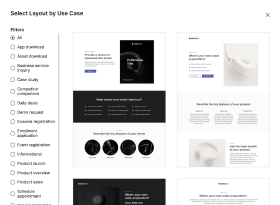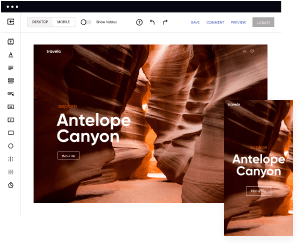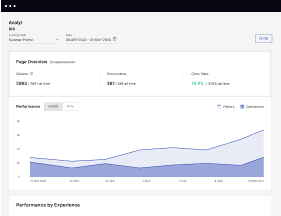Get a starting point with the Angular.js optimized disclaimer page template
Supercharge your disclaimer page with Angular.js for outstanding performance! Learn more today.

Easy to build without coding
With the intuitive drag-and-drop builder, anyone on your team can create high-converting pages without any knowledge of code or design. Make enhancements to your landing page with custom widgets using Javascript, HTML/CSS, or third-party scripts.
Multiple layouts for any industry and goal
Select from 500+ landing page layouts built to boost conversions across industry-specific scenarios. Customize them by adjusting fonts, adding images, and generating on-brand content with the AI assistant. Quickly scale with Instablocks® and Global Blocks that you can save, reuse, and update globally.
Loads fast and looks polished on any device
Every template is responsive, which means they present professionally on any device and load blazingly fast with our Thor Render Engine. You can also power them up with Google AMP technology to deliver an unparalleled mobile experience and drive higher conversions.
Robust analytics & experimentation
Get real-time updates and reporting across all your devices, showing the number of visitors, conversions, cost-per-visitor, and cost-per-lead. Launch AI-powered experiments, run A/B tests, and use heatmaps to analyze user behavior, then optimize your landing page to maximize conversions.
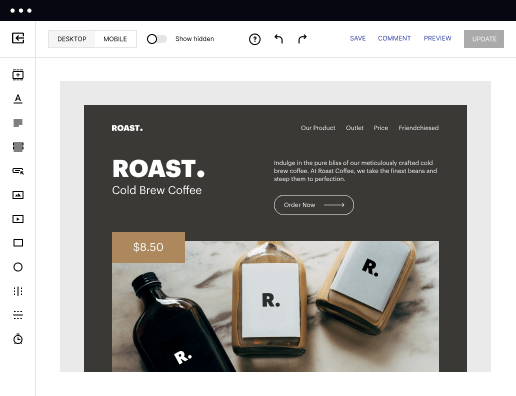
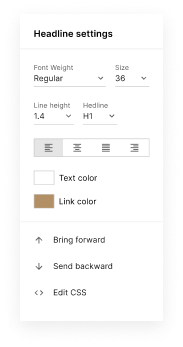
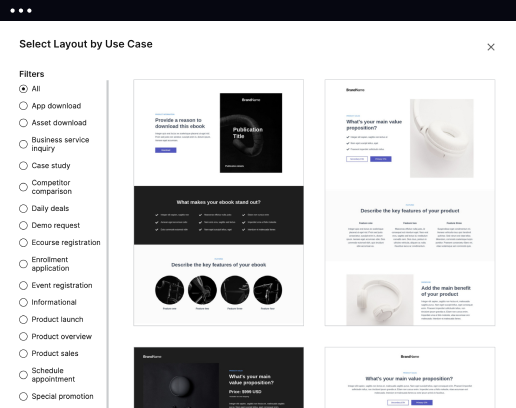
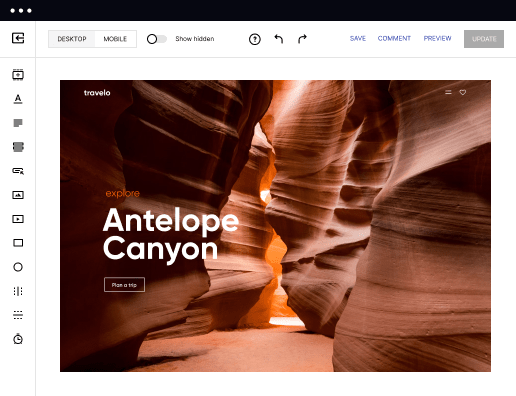

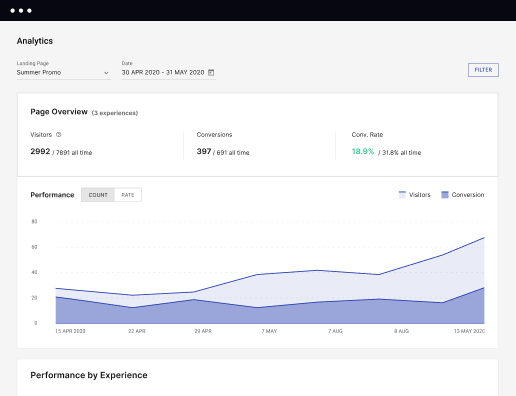
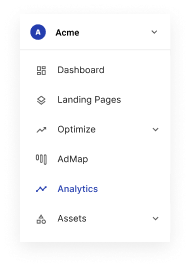
Easy to build without coding
With the intuitive drag-and-drop builder, anyone on your team can create high-converting pages without any knowledge of code or design. Make enhancements to your landing page with custom widgets using Javascript, HTML/CSS, or third-party scripts.
Multiple layouts for any industry and goal
Select from 500+ landing page layouts built to boost conversions across industry-specific scenarios. Customize them by adjusting fonts, adding images, and generating on-brand content with the AI assistant. Quickly scale with Instablocks® and Global Blocks that you can save, reuse, and update globally.
Loads fast and looks polished on any device
Every template is responsive, which means they present professionally on any device and load blazingly fast with our Thor Render Engine. You can also power them up with Google AMP technology to deliver an unparalleled mobile experience and drive higher conversions.
Robust analytics & experimentation
Get real-time updates and reporting across all your devices, showing the number of visitors, conversions, cost-per-visitor, and cost-per-lead. Launch AI-powered experiments, run A/B tests, and use heatmaps to analyze user behavior, then optimize your landing page to maximize conversions.
All the features you need to build lead-generating landing pages
Explore more featuresLearn how to build top-performing landing pages for any goal
FAQs
Leading the way in building high-performing landing pages





A comprehensive guide to optimizing your campaigns with Instapage's features
In the fast-paced digital marketing landscape, utilizing an all-in-one landing page and conversion rate optimization (CRO) platform like Instapage can dramatically enhance your campaign effectiveness. With the aim to maximize your return on investment (ROI), Instapage offers a comprehensive suite of tools designed specifically for marketers in various sectors such as business services, tech/SaaS, and education.
Understanding the power of Instapage in campaign management
Instapage serves as a powerful ally for marketers by simplifying the landing page creation process and enhancing conversion rates. Here are several key features that define its effectiveness:
- Wide range of templates: Gain instant access to over 100 high-converting templates that cater to different industries, making it easier to launch campaigns aligning with business goals smoothly.
- No coding required: The intuitive page builder allows marketers to create and customize landing pages without needing coding skills, shortening the time from concept to execution.
- Built-in optimization tools: Use features like A/B testing and heatmaps to optimize your pages continually and understand user behavior for better conversions.
Step 1: Easily build your landing page with Instablocks
Building a landing page should be both straightforward and effective. Instapage provides a variety of Instablocks that let you create custom, conversion-focused layouts:
- Drag-and-drop functionality: This allows marketers to customize every element of their landing pages without any technical expertise, ensuring designs are visually appealing and optimized for performance.
- Instant publishing: Once your page design is complete, you can publish it with a single click, ensuring that your campaigns are live and generating leads in no time.
- Flexible integrations: Instapage integrates seamlessly with various marketing tools, allowing marketers to access the metrics that matter most to them.
Step 2: Leverage optimization features for higher conversions
To ensure maximum effectiveness, optimizing each landing page is crucial. Here’s how Instapage helps in that aspect:
- A/B testing capability: Instapage lets you experiment with different layouts and messaging, enabling you to identify what resonates best with your audience, driving improvements in key conversion metrics.
- Detailed analytics dashboard: This feature provides real-time insights and performance metrics, allowing teams to make informed decisions based on data rather than assumptions.
- Heatmaps for insights: Understand user engagement on your pages comprehensively through visual representations of where users are clicking or dropping off.
Step 3: Personalize content for increased engagement
Creating targeted experiences for unique audiences can significantly improve your conversion rates. With Instapage, you can personalize content:
- Dynamic text replacement: Tailor landing page content based on individual user attributes to catch their attention effectively.
- AdMap integration: Align your specific ads with relevant landing pages, ensuring a seamless transition from advertisement to conversion.
- Audience-level tracking: Monitor specific metrics based on different audience segments to assess which strategies work best for diverse groups.
Effectively utilizing Instapage's features can transform your marketing strategies, driving conversions and boosting your ROI.
Ready to start enhancing your campaigns? Give Instapage a try today and discover how these powerful features can optimize your landing pages and accelerate your success!
AngularJS optimized disclaimer page template: maximizing clarity and compliance
Understanding the importance of disclaimer pages
Disclaimer pages serve as a critical aspect of many websites, allowing businesses and individuals to articulate their legal standing regarding the information presented on their platforms. These pages are essential for clarifying the limitations of liability, guiding users on the correct use of the website, and providing necessary legal disclaimers regarding the information shared. As such, a well-crafted disclaimer page is foundational in establishing the credibility and trustworthiness of the website.
The legal implications of disclaimer pages cannot be underestimated, as they often play a pivotal role in protecting organizations from potential lawsuits. Compliance requirements vary depending on jurisdictions, but common elements include statements regarding accuracy and the use of external links. In many cases, organizations face scrutiny based on how well they communicate their disclaimers, hence transparency becomes an integral part of building user trust.
Definition and purpose: To outline limitations and guide user interaction.
Legal implications: Protect organizations from legal action.
Trust and transparency: Foster user confidence in the information.
The AngularJS advantage
AngularJS is a powerful JavaScript framework that significantly enhances the development of dynamic web applications, making it an ideal choice for creating optimized disclaimer pages. By leveraging AngularJS, developers can build rich, interactive interfaces that provide users with a seamless experience while navigating the necessary legal information. Its architecture allows for the development of complex applications while maintaining high performance.
One of the standout features of AngularJS is its two-way data binding, which ensures that any changes made in the user interface are immediately reflected in the data model, and vice versa. This interactivity enhances user engagement and ensures that the disclaimer page updates dynamically based on user input or context. Additionally, AngularJS facilitates dependency injection, which optimizes code organization and reusability. Combined with directives that allow the creation of custom HTML tags and reusable components, AngularJS empowers developers to design efficient and maintainable applications.
Two-way data binding: Ensures synchronization between UI and data models.
Dependency injection: Optimizes code modularization.
Directives and components: Enables reusable and maintainable code.
Core components of an optimized disclaimer page
To create an effective disclaimer page, the content structure must prioritize clarity and conciseness. Legal jargon should be minimized, and language should be straightforward to ensure that all users can easily understand the information provided. Adding interactive elements such as tooltips and accordions can enhance user engagement, allowing visitors to access detailed information on demand without overwhelming them with extensive text.
The layout and design of the disclaimer page are equally significant. Web accessibility guidelines should be adhered to, ensuring that the page is easily navigable for all users, including those with disabilities. Utilizing responsive design principles guarantees that the page displays correctly across various devices and screen sizes, meeting user expectations. Furthermore, essential legal elements need to be incorporated, such as liability limitations, copyright notices, and the terms of user agreements. These components form the backbone of legal compliance for an effective disclaimer page.
Content structure: Clear language and user-friendly content.
Layout and design: Responsive and accessible design principles.
Essential legal elements: Liability limits and user agreements.
Implementing AngularJS for a dynamic disclaimer page
To implement an AngularJS optimized disclaimer page, it is crucial to first set up the development environment with the necessary technologies. This includes installing AngularJS and ensuring compatibility with other frameworks that may enhance the disclaimer page's functionality, such as front-end tools like Bootstrap for design and layout.
Once the setup is complete, the next step is to develop the template. This begins with creating a controller tailored for managing content, which involves utilizing AngularJS’s scope to provide a clear data interface. This setup allows for dynamic content updates based on user interactions. Following this, designers can structure HTML using AngularJS directives, which facilitate the incorporation of dynamic elements into the page layout. Additionally, integrating CSS frameworks can streamline styling and enhance the user experience, ensuring that the page remains visually appealing and functional.
Setting up: Ensure the environment is equipped with necessary frameworks.
Creating controllers: Manage dynamic content with established scope.
Structuring views: Use AngularJS directives for dynamic layouts.
Enhancing user engagement with features
User engagement is crucial for any web application, including disclaimer pages. AngularJS facilitates this through its components that can be leveraged for interactivity. For instance, integrating modal pop-ups can provide additional information without navigating away from the page, allowing users to deepen their understanding of specific disclaimers without cluttering the main content area.
Furthermore, real-time feedback forms enhance user experience by allowing visitors to communicate quickly and efficiently. Using the RootScope, developers can manage shared data across various views, making it easier to maintain consistency in user interactions and responses. Incorporating state management techniques helps streamline user journeys, ensuring that each interaction remains cohesive and user-friendly.
Modal pop-ups: Provide extra information without navigation.
Feedback forms: Enhance interaction and user engagement.
RootScope: Manage shared data for consistent user experiences.
Performing testing and quality assurance
When dealing with legal documents such as disclaimer pages, thorough testing is of utmost importance. Ensuring that all links work correctly, and the content is easily presented without errors is essential for maintaining legal enforceability and user trust. By implementing rigorous testing methodologies, developers can identify and rectify potential issues before they impact the user experience.
Testing AngularJS applications can be approached using various techniques. Unit testing with frameworks like Jasmine allows developers to test individual components to make certain they function correctly. Furthermore, end-to-end testing with tools such as Protractor verifies the complete workflow from the user's perspective, ensuring that all elements of the disclaimer page behave as expected during actual user interactions.
Importance of testing: Protect legal compliance and user trust.
Unit testing: Validate individual components using Jasmine.
End-to-end testing: Ensure workflow integrity with Protractor.
Engaging with communities for feedback and improvement
Engaging with developer communities is an essential avenue for growth and improvement in the use of AngularJS. By joining platforms such as Stack Overflow or GitHub, developers can share their experiences and challenges, leading to collective learning and enhancement of best practices in creating optimized disclaimer pages.
These collaborative spaces encourage feedback on existing templates, paving the way for continuous improvement. By actively participating in discussions and sharing insights, developers can refine their approaches, adopting new techniques that aid in the development of more effective and compliant disclaimer pages.
Joining communities: Access peer support and collective knowledge.
Feedback mechanisms: Gather insights to improve templates.
Enhancing practices: Adopt new techniques through collaboration.
Future trends in AngularJS and disclaimer pages
The landscape of web development is rapidly evolving, and the expectations placed on web pages—including disclaimer pages—continue to change. With increasing attention on user experience and legal compliance, future trends will likely focus on enhancing the integration of technologies that improve page functionality and transparency. These advancements will encourage web developers to create increasingly sophisticated disclaimer pages that not only meet legal standards but also resonate with user experience design.
Future advancements in AngularJS technology will enable developers to build even more responsive, efficient applications. Improved performance metrics and enhanced user feedback mechanisms may also emerge, ensuring that web pages can adapt swiftly to user demands. As regulations around digital content tighten globally, it will become imperative for websites to maintain clear and accessible disclaimer pages, further emphasizing the need for tools and frameworks that support effective legal compliance.
Evolving standards: Focus on user experience and legal compliance.
Advancements: Build more efficient applications with AngularJS.
Collaborative efforts: Adapting to regulatory changes in digital information.
Practical examples and case studies
Successful implementation of AngularJS optimized disclaimer pages can be observed in various case studies across different sectors. Organizations that have effectively utilized AngularJS templates report significant improvements in user engagement metrics. By employing strategies like interactive elements and enhanced navigation, these cases showcase how a well-designed disclaimer page can lead to higher levels of user comprehension and compliance.
In analyzing user engagement metrics pre-and post-optimization, notable trends emerge, highlighting how an investment in quality and clarity for disclaimer pages translates to enhanced user trust and retention. Developer testimonials often emphasize the effectiveness of AngularJS templates in simplifying the development process, allowing teams to focus on creating legally sound and user-friendly pages.
Showcasing success: Examples of improved disclaimer pages.
Engagement metrics: Measuring user comprehension and compliance.
Developer insights: Feedback on AngularJS template effectiveness.
Ready to skyrocket conversions?
Supercharge your ad campaigns with high-performing landing pages
Get started



